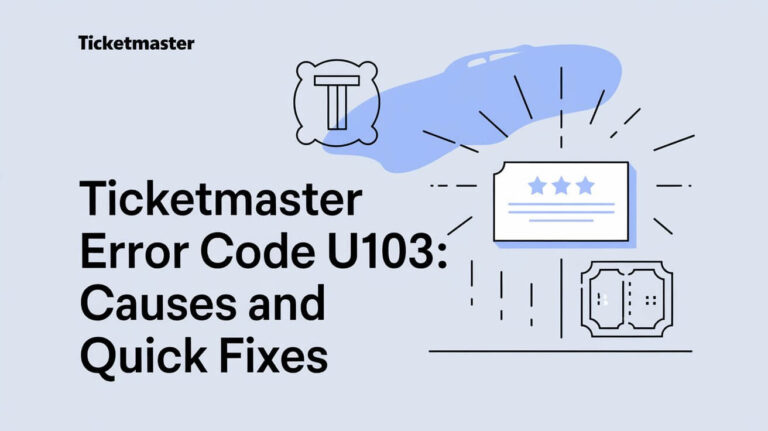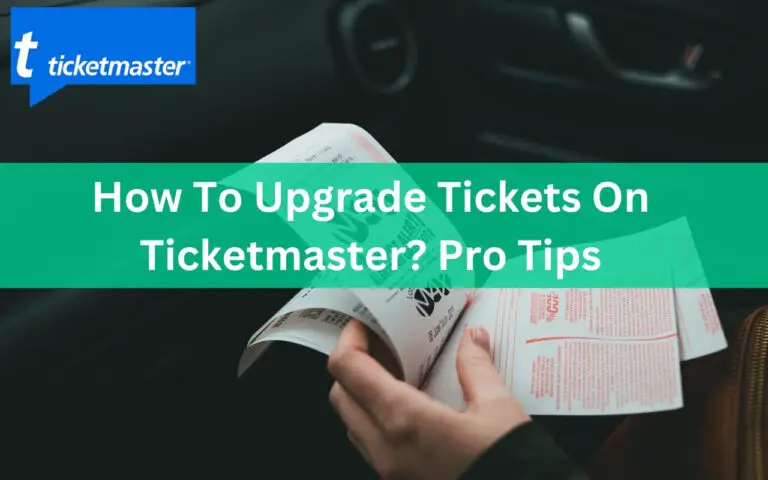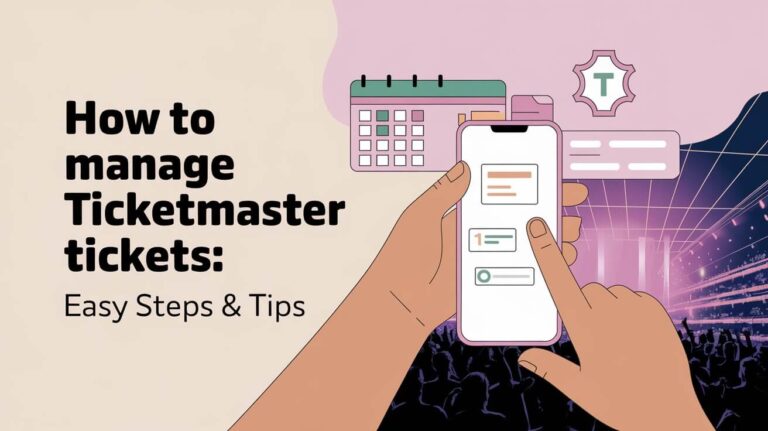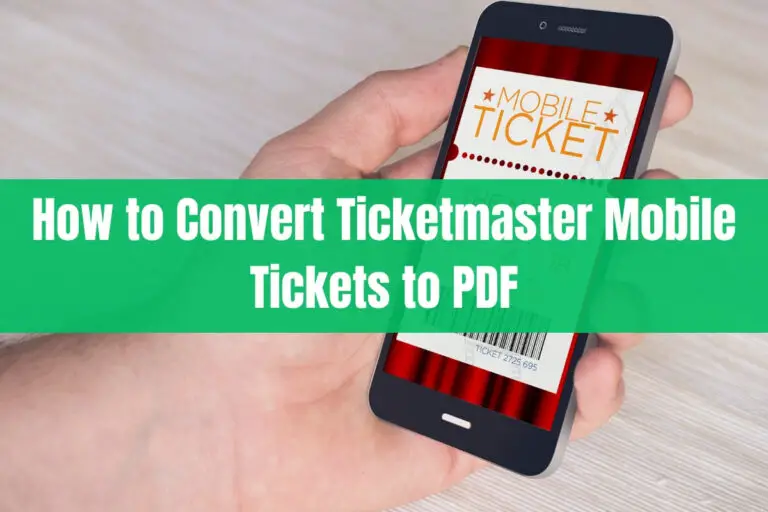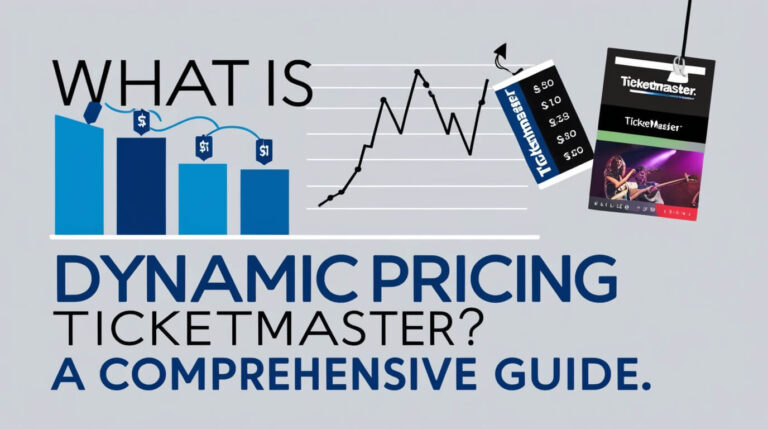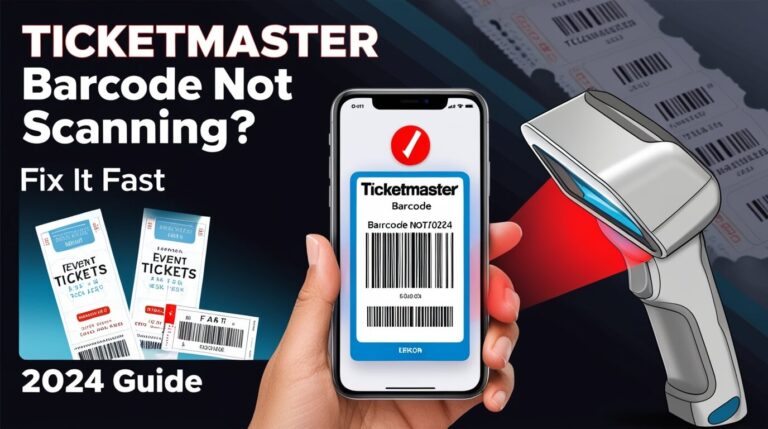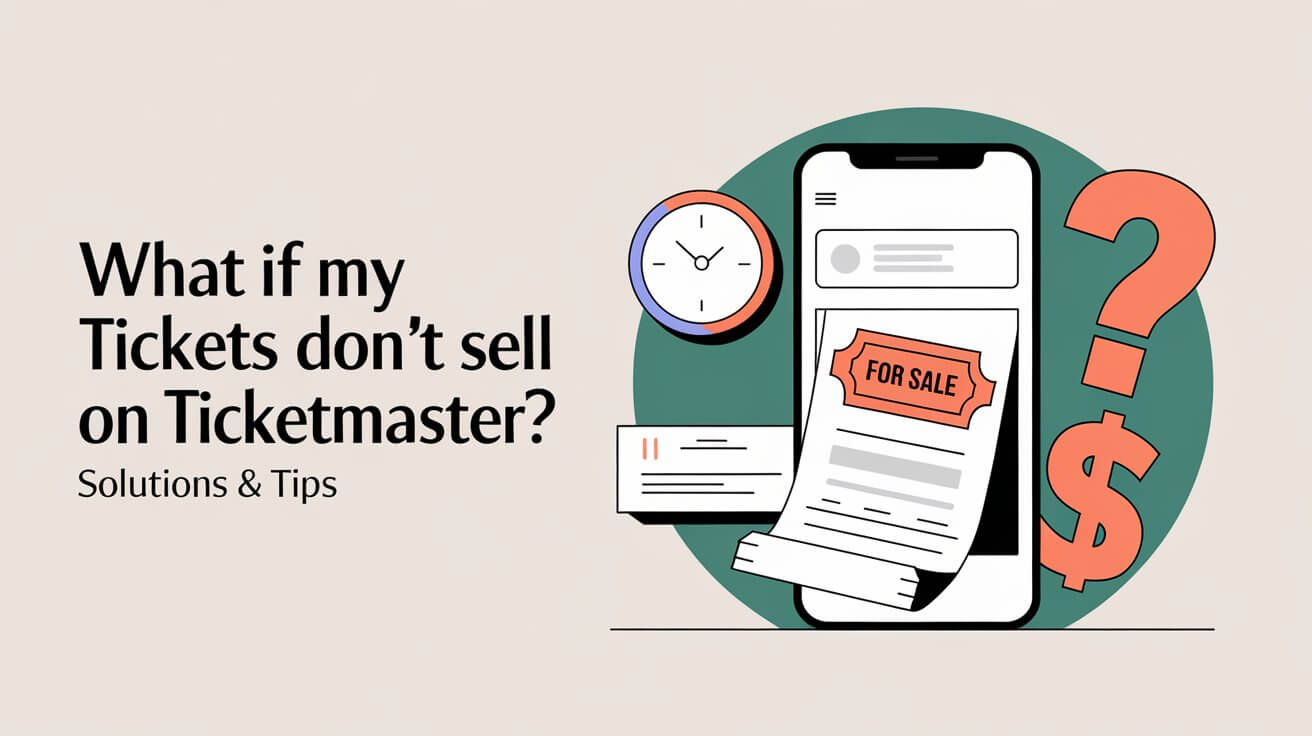
Ever found yourself with Ticketmaster resale tickets that won’t sell? You’re not alone. Many fans struggle with this, making it frustrating, mainly when trying to get your money back. Ticketmaster’s Face Value Ticket Exchange lets fans sell tickets at face value. But, what if your tickets are unsold?
When trying to sell tickets on Ticketmaster, knowing the resale process is key. Ticketmaster has strict rules, like limits on how many tickets you can resell and minimum prices. Understanding these rules can help you sell your tickets. If you’re having trouble, it’s time to find ways to sell your tickets and make the most of your experience.
Quick Actions for Unsold Ticketmaster Tickets
To sell unsold tickets on Ticketmaster, quick and effective actions are key. Adjusting ticket prices based on demand is a critical step. By watching the market and changing prices, sellers can make their tickets more appealing.
When and how you list your tickets also matters a lot. Listing at the right time can help you reach more people. Using Ticketmaster’s promotional tools can also attract buyers and boost sales.
Price Adjustment Strategies
Sellers should adjust their ticket prices to match the market demand. This means keeping an eye on similar ticket prices and adjusting theirs. Remember to consider the face value and any resale price limits set by the event organizers.
Optimal Listing Times
On Ticketmaster, you can update or remove listings anytime. This lets sellers manage their tickets well. List your tickets when it’s best to reach more people. You can list until an hour after the event starts, giving you flexibility.
Promotional Tools on Platform
Ticketmaster has tools to help sellers attract buyers. Using these tools can increase your chances of selling. It’s important to manage your listings well and remove them if not sold to avoid fees.
Common Reasons Tickets Remain Unsold
Understanding why tickets don’t sell is key in event ticket sales. High prices, low demand, bad seats, and poor promotion are common reasons. For example, too-high ticket prices can scare off buyers, leading to unsold tickets. If an event isn’t promoted well, it might not draw enough people.
Weather, rescheduling, or double shows by artists can also impact ticket demand and prices. If an event is moved, ticket demand might drop, and prices could change. To make up for losses, sellers can buy tickets for popular shows and use tools to track the market. Keeping an eye on ticket listings on sites like Stubhub and Ticketmaster helps stay competitive.
Lowering ticket prices a bit can help avoid big losses if tickets don’t sell. Remember, service fees for reselling can be from 0% to 15%. Some platforms offer different payment options. By understanding these factors and adjusting their strategies, sellers can sell more tickets and make more money.
Price Analysis and Market Research
To find the best ticket prices, it’s key to do deep market research. This means looking at what others are selling for, local event factors, and demand patterns. Knowing the competition helps in setting prices wisely.
Ticketmaster’s data shows big changes in the ticket market. Before, about 5% of tickets were sold on the secondary market. Now, with auctions, prices better match what tickets are worth. This makes the market more efficient, where sellers get the ticket’s full value.
Key Factors in Ticket Pricing
- Competition from other sellers
- Local event factors, such as venue and date
- Demand patterns, including peak buying periods and last-minute sales
Looking at these factors and doing detailed research, sellers can price tickets right. A good competition assessment helps sellers stand out and attract more buyers.
| Event Type | Average Ticket Price | Peak Buying Period |
|---|---|---|
| Concerts | $100 | 1-2 weeks before the event |
| Festivals | $200 | 2-3 months before the event |
Understanding the ticket market and doing thorough research helps sellers succeed. It’s all about making smart decisions in a competitive market.
Ticket Transfer Options on Ticketmaster
Ticketmaster makes it easy to transfer tickets to others. This is true for most events, but there are some rules. For example, you can’t transfer tickets if the venue doesn’t allow it or if the event is over.
Users can transfer some or all of their tickets, including parking passes in some cases. The person getting the tickets needs a Ticketmaster account. Also, you can re-transfer tickets to someone else if needed.
Here are some key things to know about ticket transfer on Ticketmaster:
- Ticketmaster will never charge a fee for a name change or to transfer event tickets.
- Tickets can be transferred even before they are physically delivered.
- Other items, such as merchandise, may be eligible for transfer based on the event and organizer’s policies.
| Feature | Description |
|---|---|
| Ticket Transfer Fee | No fee for name change or ticket transfer |
| Transfer Eligibility | Most events, but some restrictions apply |
| Recipient Requirements | Must have a Ticketmaster account |
Understanding Ticketmaster’s ticket transfer options and policies, users can easily manage their tickets. This ensures a smooth experience for everyone involved.
Alternative Selling Platforms
Ticketmaster isn’t the only place to sell tickets. Platforms like StubHub and SeatGeek offer a wide variety of tickets for different events. They have unique features and benefits.
These platforms have advantages like lower fees and flexible pricing. For example, Tickets.com charges about $2.50 per ticket. This can save sellers money. Twickets even allows reselling at face value or less, making it fair for buyers.
Comparison of Features
- StubHub has a vast selection of tickets worldwide. It focuses on protecting customers and providing support.
- SeatGeek offers clear pricing. Sellers can also edit or remove listings before the sale, giving them control.
- Local options like TicketsCandy and TicketLeap have flat fees and flexible pricing. They’re good alternatives to big platforms.
The right platform for selling tickets depends on what the seller needs. By looking at fees, features, and support, sellers can choose the best platform for them.
What If My Tickets Don’t Sell On Ticketmaster: Platform Solutions
Ticketmaster has many ways to help sellers who can’t sell their tickets. One big solution is the Face Value Ticket Exchange. It lets sellers sell their tickets for the original price. This stops ticket scalping and helps buyers get fair prices.
Another option is the Fan-to-Fan Resale feature. It lets sellers sell tickets to other fans. But, there are rules like resale limits and verification checks. For example, tickets bought on payment plans might have resale limits until the full amount is paid.
Some key things to remember for sellers on Ticketmaster include:
- Resale rules and restrictions set by venues, artists, and Ticketmaster
- Verification requirements for tickets sold on the platform
- Payment plans and deposit schemes that may impact resale eligibility
- Technical issues and platform rules that can hinder ticket resale
Knowing these things and using Ticketmaster’s solutions, sellers can sell their tickets. They can find a way to make money from unsold tickets. With the right strategy, sellers can succeed on the Ticketmaster platform.
| Feature | Description |
|---|---|
| Face Value Ticket Exchange | Allows sellers to sell tickets at face value |
| Fan-to-Fan Resale | Enables sellers to sell tickets to other fans, subject to certain rules and restrictions |
Timing Strategies for Ticket Sales
Knowing when to sell tickets is key for sellers to make the most money. By looking at buying patterns and sales data, sellers can find the best times to list their tickets. The best times to sell are often when demand is high, like during holidays or special events.
To sell more tickets, sellers should think about when to list them. Waiting rooms open 15 minutes before tickets go on sale. Ticket queues show how many fans are waiting to buy. Fans should only use one device, browser, and tab to avoid problems.
Some events limit how many tickets one person can buy. Also, there’s a short time to buy tickets for popular events.
Peak Buying Periods
Peak buying times can be found by looking at sales data and patterns. For example, summer concerts or holiday events might see more demand. Listing tickets during these times can help sellers make more sales.
Last-Minute Sale Tips
For last-minute sales, being ready and flexible is important. Don’t refresh the browser or leave the tab after adding tickets. Mobile tickets can be managed through the Ticketmaster app or mobile wallet.
The ticket sharing feature makes it easy to transfer tickets within a group. Reselling tickets is also easier for events with this feature.
| Ticket Sales Timing | Peak Buying Periods |
|---|---|
| Waiting rooms open 15 minutes prior to ticket sales | Holidays or special events |
| Ticket queues specify the number of fans in line ahead of a purchase | Summer concerts or holiday events |
Refund Policies and Possibilities
Ticketmaster has clear rules for refunds when events are canceled, rescheduled, or moved. If an event is canceled, you might get a refund of what you paid. This depends on certain rules, or you can choose a credit from the Event Organizer.
For events that are rescheduled, postponed, or moved, you have options. You can keep your tickets or ask for a refund or credit. Here are some important things to know about Ticketmaster’s refund policies:
- Refunds for canceled events go back to your original payment method. This happens after the Event Organizer sends the money.
- Any extra purchases, like upgrades or add-ons, get a full refund. This is true whether you choose a refund or credit.
- Credits for rescheduled events are given as promo codes. These can be used for future eligible purchases.
- Refunds for rescheduled events also go back to your original payment method. This happens after the Event Organizer sends the money.
It’s important to read Ticketmaster’s Purchase Policy. It has all the details on refund policies and how they work. Knowing these rules helps you make smart choices about your ticket buys and any refunds or credits you might get.
| Event Status | Refund/Credit Options |
|---|---|
| Canceled | Refund of paid value or credit offer |
| Rescheduled/Postponed/Moved | Keep tickets, refund, or credit as specified by Event Organizer |
Social Media Marketing Methods
Social media can be a strong tool for selling tickets. Sites like Facebook and Twitter offer many ways to find buyers. By using these platforms, you can get more people to see and buy your tickets.
Creating interesting listings on Facebook Marketplace is a smart move. This platform lets you reach lots of people. Make sure your listings are clear, include prices, and have good photos to stand out.
Facebook Marketplace Tips
- Use high-quality photos to showcase your tickets
- Include detailed descriptions of the event and seating information
- Set competitive prices based on market demand
Twitter Promotion Strategies
Twitter is also great for promoting tickets. Use hashtags and tag accounts to get more eyes on your tweets. It’s also a good place to talk to people interested in your tickets.
| Platform | Features | Benefits |
|---|---|---|
| Facebook Marketplace | Large audience, easy listing process | Increased visibility, more buyers |
| Real-time engagement, hashtag targeting | Improved promotion, wider reach |
Using social media can help sell your tickets fast. Whether on Facebook Marketplace or Twitter, focus on making your listings interesting. Promote them well to attract more buyers.
Legal Considerations for Ticket Resale
When you sell tickets, knowing the law is key. Laws and rules for ticket resale change by state and platform. It’s important to follow these to avoid trouble. In the U.S., sellers must show their bank account and tax info, like a Social Security Number.
Ticketmaster has rules for resale prices. These rules help keep ticket prices fair. Some events have their own rules, like not selling tickets for less than face value. Sellers need to think about these rules and what buyers want when setting prices.
State Regulations
States have different rules for ticket resale. Some limit how much prices can go up or stop bots from buying tickets. Knowing these rules is important for selling tickets well. Here’s a quick look at some state rules:
| State | Regulation |
|---|---|
| California | Limit on price increases: 10% |
| New York | Prohibition on bot use |
| Florida | Limit on price increases: 20% |
Platform Rules
Ticketmaster has its own rules for selling tickets. Sellers must have bought tickets from Ticketmaster or approved sellers. They also need to follow event-specific rules, which can change. By knowing the laws and rules, sellers can sell tickets legally and successfully.
Risk Mitigation for Future Purchases
When buying tickets, it’s key to think about the risks and how to avoid them. Knowing the ticket purchase policy and watching out for scams is important. Ticketmaster’s terms say the policy is a legal agreement between the user and Ticketmaster.
To lower risks, buyers can follow these steps:
- Verify the authenticity of tickets before purchasing
- Check for any restrictions on ticket transfers and entry
- Be aware of pricing, including base ticket prices and applicable fees
Being informed and taking these steps, buyers can lessen their risk. It’s also important to keep up with the latest on ticket buying and resale. This helps make smart choices.
| Risk Mitigation Strategy | Description |
|---|---|
| Verify ticket authenticity | Check the ticket’s validity and ensure it’s from a trusted source |
| Understand pricing | Be aware of the base ticket price and applicable fees |
| Check for restrictions | Look for any restrictions on ticket transfers and entry |
Final Thoughts
Exploring the Ticketmaster ticket resale market shows it’s complex. To succeed, you need a smart plan. This includes understanding prices, using special tools, and looking at other ways to sell.
It’s not just about making back what you spent. It’s about building a ticket sales strategies that will help you in the future.
Whether you have unsold tickets or want to sell future ones, this article offers helpful tips. These strategies will help you make the most of the ticket resale market. You’ll be able to make better choices and enjoy your event more.
Stay up to date and flexible. The Ticketmaster resale world has many chances for you to succeed.

